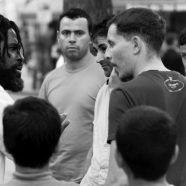Welcome to the general rehearsal of the performance #Building Conversation ZAGREB 2016!
We are pleased to invite you to the sneak preview – final rehearsal of the performance #BuildingConversationZAGREB2016 by Lotte van den Berg & Daan ‘t Sasa!
If you are interested in how the way we talk about the world creates the world we live in, if you are intrigued by or would like to try the conversation techniques of different cultures and people, or you simply can’t make it to the performance, you can apply with your contact mobile phone on ganznovifestival@gmail.com, until midnight October 12th, on one or more of the these conversations & dates:
Thursday, October 13th, from 14-17h Parliament of Things
We are accustomed to humans speaking not only for themselves but also on behalf of other entities – the universe, the rain forest, the animals, the city. The Parliament of Things is a theory of Bruno Latour that makes a case for the rights of objects. In modern thought, people refuse to recognize the rights, autonomy and agency of objects and other entities, according to Latour. He argues for a human viewpoint in which the values (not the value) of objects and other entities play an active role. When developing this form of conversation, we want to take a distance from anthropocentric thinking in which humans place themselves at the centre of existence, and consider what the relation is between us and things. Can we speak on behalf of things? Are we in them? Are we opposite to them?
Another source of inspiration for Parliament of Things is the Council of All Beings, a worldwide practice that investigates our relation to nonhuman entities – namely, nature. Among other things, this “Council” refers to a ritual of the Aboriginals, who consider themselves connected with plants, clouds, and a mountain as if they were their ancestors. They use masks to speak on behalf of these entities. We want to use masks in a similar way in this conversation/performance and investigate what it means for us Westerners to speak on behalf of things, on behalf of nature. Will this remain a dualistic relation, from a person to a thing, or is it conceivable that a different relation will arise, that we give ourselves a different place in the universe?
Friday, October 14th, from 10-13h Time Loop
Are we capable of going back in time before we were born, ahead to after we die? Indians from the Great Lakes District in Canada have the tradition to, before making an important decision, consult first their ancestors from seven generations ago, and after that, their descendants from seven generations in the future as well. Only in the third instance do they study what impact the eventual decision will have on the present. In the West, short-term thinking is what often seems to prevail over looking ahead and looking back. As a result, the future becomes an abstract, remote perspective, unconnected to the world we live in. Can being related to the distant past help us in relating to the distant future?
Inspired by the practice of the Indians from the Great Lakes District but also by contemporary thinkers like Giorgio Agamben, who speaks of the importance of being strongly rooted in the past in order to have a vision of the future, we are creating a method of conversation with various rounds in which the participants alternatingly talk from the perspective of their ancestors, their descendants and themselves. Can we expand our awareness of time, the time-space in which we live, and enlarge our thinking? There appears to be a shortage of time on all levels – daily life, within a person’s lifespan, in relation to climate change, etc. We feel like we are in a race against the clock. We are already too late, it seems. What would happen if we ‘zoom out’ in time? Does this put the decisions we make into perspective or does it make them extra urgent?
Friday, October 14th, from 15-18h Agonistic Conversation
Inspired by conflict theory of Chantal Mouffe and by mode of conversing peculiar to the Maoris from New Zealand, we carry on a conversation between opponents; a conversation in which conflict and differences are considered sources of change and creativity. If you avoid conflict, you stand still. When you face conflict, not knowing where it will lead to, you are on the move.
The entrance is free!
Supported by apap – Performing Europe 2020, within the EU program Creative Europe

